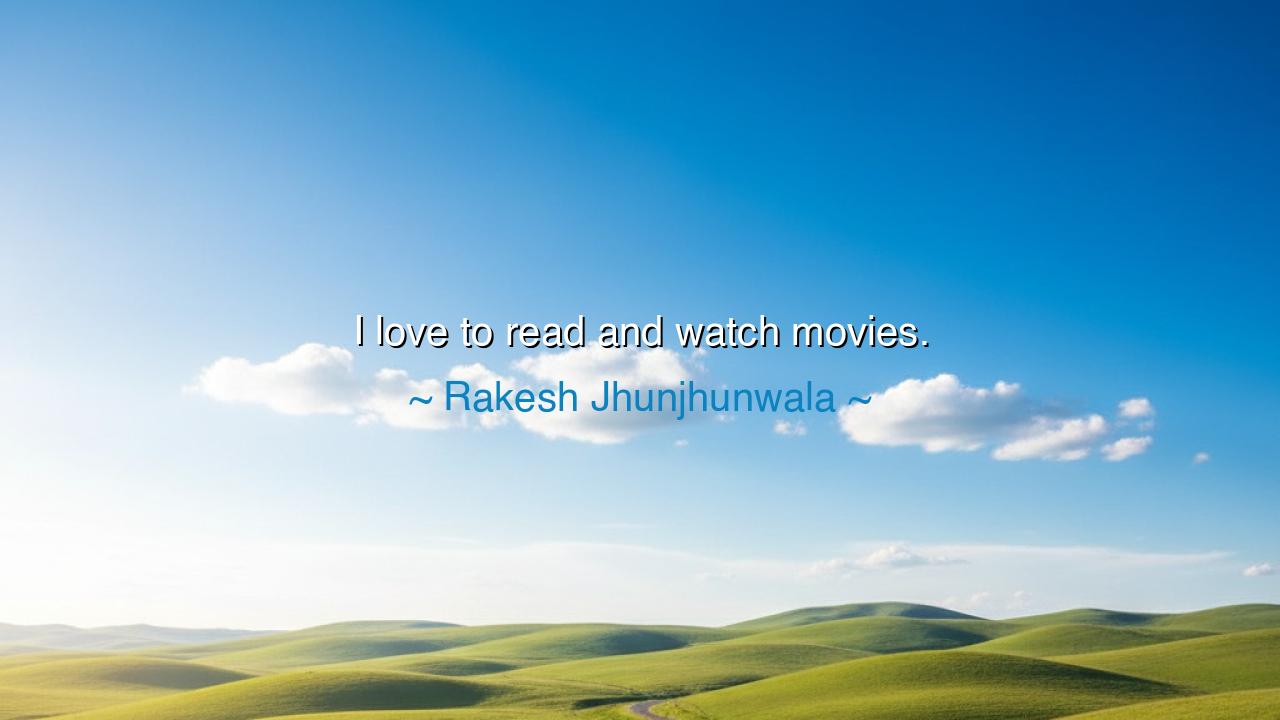
I love to read and watch movies.






Hear now, O Seekers, the simple yet profound words of Rakesh Jhunjhunwala: "I love to read and watch movies." Though these words may appear plain, they carry within them the essence of curiosity, imagination, and the life of the mind—qualities that have always driven the greatest minds of humanity. For it is in the act of reading and watching that we are transported beyond the limits of our own lives and experiences, and are granted the gift of exploring the vast worlds of ideas, stories, and dreams.
Consider, O children of the future, the ancient philosophers, whose minds were shaped by their study of the written word. Think of Socrates, whose life was devoted to the pursuit of wisdom through dialogue and learning. It was through his readings, his deep engagement with ideas, that he sought to understand the truths of the human condition. Like Socrates, Jhunjhunwala’s statement reflects a timeless truth: knowledge—whether through the written word or through the lens of cinema—has the power to shape the soul, to expand the horizon of the individual, and to cultivate a deeper understanding of the world.
In ancient times, the storyteller was revered not only for their ability to entertain but for their capacity to enlighten. Homer, the great poet of ancient Greece, did not simply tell tales for the sake of amusement; he crafted stories that spoke to the very core of human nature. The Iliad and the Odyssey were not just adventures—they were deep explorations of honor, love, betrayal, and the complexity of life itself. Similarly, movies today carry that same power—though they may be in a different form, they too shape our understanding of the world. The visual storytelling of films allows us to experience not only the external world but the internal world of emotions and ideas. Jhunjhunwala’s love for movies is a reflection of the understanding that these moving images, like the epic poems of old, carry the weight of human experience.
Yet, it is not merely the act of watching or reading that is of value, but the engagement that these acts require. To read a book or to watch a film is not to passively consume; it is to engage in a dialogue with the creators, to wrestle with the ideas presented, and to discover new truths. Like the great scholars of the ancient world, who would read the texts of their time and engage with them through debate and reflection, we too must read and watch with the intention of learning. The world is filled with stories and ideas that can shape our thoughts, our values, and our actions—but only if we engage with them fully, with an open heart and a willing mind.
In this, we see the power of both reading and movies to shape not just the mind, but the soul. Consider the great minds of history who were shaped by books: Leonardo da Vinci, who studied the works of ancient philosophers and created masterpieces not only of art but of scientific discovery. Albert Einstein, whose imagination and intellect were nourished by his love of reading and learning. Just as these men, like so many others, were influenced by the ideas they consumed, so too can we be shaped by the books and films that inspire us. Jhunjhunwala understands the transformative power of these mediums—not simply as sources of entertainment, but as tools for growth, self-discovery, and understanding.
And so, O Seekers, let us take this lesson to heart: the act of reading and watching is not merely about filling our minds with information, but about cultivating a life of reflection and growth. Each book we read, each movie we watch, is an opportunity to learn about the world, to step into someone else’s shoes, to understand the diversity of human experience. Just as Jhunjhunwala found inspiration in these acts, so too can we find in them the seeds of our own greatness. Knowledge is not a static thing, but a living, breathing force that can grow and change us if we allow it.
Finally, O Children of the Future, remember this: the world is filled with endless stories and ideas waiting to be explored. Like Socrates, who sought truth in the dialogue of his day, or Homer, who wove the myths that have endured for millennia, we must continue to seek the knowledge and wisdom of the ages. Do not limit your growth to the immediate world around you, but reach out through the written word and the silver screen, embracing all that they offer. For in doing so, you will find that each new book and each new film is not just a window into another world, but a mirror through which you can better understand yourself.






AAdministratorAdministrator
Welcome, honored guests. Please leave a comment, we will respond soon